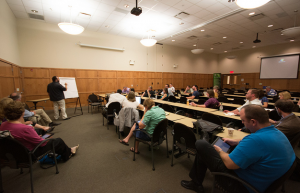
One week ago I attended the first Edcamp Leadership, held in Monroe, NJ. The event was attended by a lot of friendly folks from New Jersey and surrounding areas, including administrators, teachers, tech integrators, curriculum specialists, and other fine educators. I was especially excited to meet valued members of my PLN Akevy, Shira, and Jason for the first time!
For those of you unfamiliar with the Edcamp model, the day’s learning sessions are created and presented by the event attendees. Participants sign up on the “board” to share sessions throughout the day. Attendees then choose from the menu, and the “vote with your feet” rule applies: if you don’t like the session you’re in, up and leave and head to another session. There’s a focus on conversation and making sure the day is meaningful for you as the learner.
I attended a number of sessions, ranging from learning more about Evernote and its use in schools to a discussion about personal preconceptions and how they shape our supervision and evaluation of teachers. Here are some highlights of the sessions I attended last week.
Evernote – There are a lot of uses for Evernote in schools, most of which I’ve never fully explored. I mainly use Evernote for personal notetaking, thankful I can access my notes from any device. I will sometimes use the web clipper, but again, I’m not sharing my clippings with the world. I asked the Twitterverse how they’re using Evernote in schools, and many admin chimed in that they use them for note-taking during observations and walkthroughs, which can then be shared with staff (and some even include photos). Our session facilitator referenced Nick Provenzano’s Epic Evernote Experiment, which I recommend to any teacher interested in learning more about how to use Evernote with students in the classroom.
Google Sites for ePortfolios – I stopped into a session about the use of Google Sites since we are a Google Apps school, and I’d like to encourage the use of portfolios for student use. This Livebinder of resources was shared.
#satchat – Brad Currie and Scott Rocco began #satchat to involve educators in rich discussions of educational topics. Held Saturday mornings at 7:30 AM EST (thus my struggle to attend on a regular basis ;)), the Brad and Scott are passionate about learning and leading and did a fine job facilitating a session about the power of the PLN. To learn more about #satchat and the tools and features they use to support this endeavor (such as Storify, which I used only once, but found I really like), check out this post.
He, She, They, We: Tools for Faculty Evaluation and Development with @DrTimony – I always try to attend David’s sessions, because he’s wicked smart and I go in hoping some of his intellect will jump off of him and land on my shirt or my shoes or something and somehow seep into my brain. Our central question was, “How do our unspoken perceptions influence evaluation before decision-making occurs?” He referenced Michael Polanyi and tacit knowledge and its impact on our supervisory roles of teachers. We talked about good design and how something that is designed well requires few, if any, instructions to work it properly. How do our inherent feelings lead us to reasoning (making excuses to ourselves); how do our pre-cognitive decisions made by our brain (our brain is out to get us, I remember that clearly from EdcampNYC) force us into an agenda our brain has already put in place? When we start to process our perceptions, we start to make good headway. We can then intervene on our pre-cognitive decisions and prejudices. And while we can’t always change our prejudices/feelings that we have, we can use mechanisms to help us deal with them. We discussed frameworks for supervision and evaluation and the tools we could use to ensure we’re observing in an objective, constructive manner. Shira suggested asking four nonjudgmental prompts during walkthroughs to assist with this process: “I Notice, I Wonder, What if?, How might?” These questions help shape reflections and conversations following the learning walks.
David continued to stress the importance of observing in a purely supervisory role, not evaluative in any way. I struggled with this concept, because as an administrator, truly everything I see in a classroom could be taken into account in an evaluation. Do I think supervision needs to exist in its truest form to promote professional learning? Definitely, but it’s really hard to make that distinction sometimes. I know other administrators share that sentiment. On the whiteboard David reminded us Supervision = Coaching; Evaluation = Judging.
Many participants shared that they became uncomfortable when being observed, whether by a single administrator, a team of observers, or by peers. One teacher said her students “froze” when the admin team walked in with their laptops. That, to me, indicates a bigger problem: the administrators/observers aren’t a regular presence in the classroom or school. The culture of the school should support a sense of openness: We don’t teach behind closed doors here, everyone is welcome at any time!
Conversations swirled around the term “effective practice” – determined by whom? What is the evidence of effectiveness? Are we asking students, “What are the characteristics of the most effective teacher you ever had?” Will those responses be the same for every student? Does every effective teacher practice the same way as every other effective teacher? What tool are we using? Checklists? Rubrics? David remarked that we use these standardized tools in a “prophylactic sense.” We want to be protected from what we might write in a more qualitative fashion in an observation report.
So, do our supervisory and evaluation methods operate under the assumption that everybody gets the same thing? Or does everyone get what they need? What’s alarming to me, is that in Pennsylvania and many other states, the teacher and principal evaluation systems have been revamped to be highly standardized, insanely time consuming, and tied to standardized test scores. I am being trained in this system in a few weeks and am eager to find the opportunities for teacher autonomy in professional development that districts can hopefully intertwine into the standardized process. A colleague of mine who has piloted the new system shared the details surrounding the 11+ page paperwork completion process for one formal observation, and I think I blacked out for a minute or two.
Some final thoughts on Managing Change, a session led by @dle59 (sorry, can’t find your actual name on your Twitter page!), who shaped the conversation around Spencer Johnson’s Who Moved My Cheese? Yes, change is uncomfortable. Yes, we work with people who are entitled. “I’ve been teaching for 25 years! I’m entitled to doing things my way!” Yes, change is possible, even in large organizations, and many come to realize that it was silly of them to resist change in the first place. A great analogy was shared by a participant who asked us to consider professional athletes who are in the game too long. “It’s sad to watch, actually.” And then there are others, who realize that physically they can’t perform the way they used to, the way that’s necessary for the growth and performance of the team as a whole, so they find other ways to contribute to the profession. Look at your role. Find ways to be effective in this time of change.

I think the comments about evaluations are very telling. I was in an environment when I first started teaching where my admin was in all the time, other teachers came on their prep periods, it was modeled and encouraged by our principal. At first I was nervous being a new teacher, but when I realized it was to support me not admonish me I was fine with it. I learned so much from watching other teachers. I believe it is essential for young teachers to have this opportunity. You get to see how others, for good or not so good, do things. To this day I am always telling our admin we need to cultivate a culture of sharing. Alas, it has never really taken off as they won’t lead out. Thanks Lyn for once again providing food for thought. You are a great model for administrators.
Hi, Jared, and thanks for commenting! Yes, I think so long as teachers know that administrators are part of the team, working to help teachers grow professionally in order to strengthen the organization as a whole, the observation/walkthrough/learning walk process can be very effective. It involves being vulnerable and willing to accept constructive feedback, and it requires a tremendous deal of personal reflection and action to be most effective.
Just thought I’d pop in to clarify that @dle59’s name is Darryl Ensminger. Great meeting you at ECL!
Thanks, Damian! Great connecting with you as well!